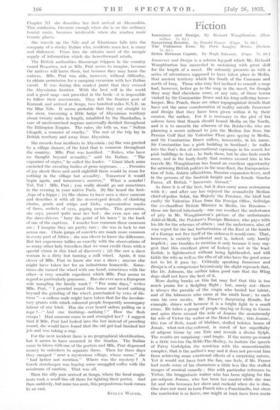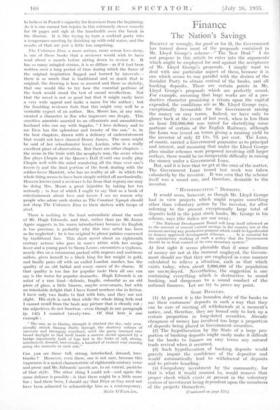Fiction
Surprising Results. By Ronald Fraser. (Cape. 7s. 6d.) The Unknown Eros. By Doris Langley Moore. (Seeker.; 7s. 6d.) Helen Between Cupids. By Hugh Edwards. (Cape. 7s. 6d.) Innocence and Design is a solemn leg-pull which Mr. Richard Waughburton has succeeded in sustaining with great skill for the length of a novel. He solemnly presents us with a series of adventures supposed to have taken place in Media, that ancient territory which lies South of the Caucasus and north of Iraq. Those who may feel inclined to consult a map had, however, better go to the snap in the novel, for though they may find elsewhere some, at any rate, of those towns visited by Sir Constantine Bruce and his long-suffering house- keeper, Mrs. Poach, there are other topographical details that have not the same corroboration of reality outside Innocence and Design that they have been given within it by their creator, the author. For it is necessary to the plot of his solemn farce that Russia should bound Media on the North, and it is to unearth the schemes of the Bolsheviks who are planning a secret railroad to join the Median line from the Persian Gulf that Sir Valentine Floss goes spying in Media, and Sir Constantine Bruce suffers, innocently, in his name.
Sir Constantine has a pink building in Scotland ; he walks into the lion's den of international espionage in his search for pink buildings in Asia ; he finds them, but he also finds much more, and in the hurly-burly that centres around him in his travels Mr. Waughburton has found an excellent opportunity for satirizing British politics in the near-East, the Europeaniza- tion of Asia, Asiatic officialdom, Russian expansion-fever, and in the persons of the Sebttish knight and his female Sancho Panza; all British " Innocents Abroad."
As farce it is of the best, but it does carry some seriousness with it ; and after one has enjoyed the scoundrelly Median chief-of-police Solak, his Majesty the Potshaw, the bhiff but crafty Sir Valentine Floss from the Foreign Office, Selfridge the ex-chauffeur British Minister in Media, the Russians— these are farccd hilariously—one can recollect the undertones of pity in Mr. Waughburtoa's picture, of the unfortunate Jalal-al-Mulk, the Potshaw's Foreign Minister, who pays with his life for the schemes of others ; and the undertones, also, of wise regret for the last barbarization of the East at the hands of a Europe not free itself of the sickness it would cure. That, however, is entirely incidental and is, indeed, only barely implicit ; one troubles to mention it only because it may sug- gest that this excellent piece of foolery is not in the least foolish, is lighthearted without being lightheaded, and will ticlde the wits as well as the ribs of all who have the good sense not to let it pass by. Critically speaking Innocence and Design is of a competence beyond only the slight reproach that, like Dr. Johnson, the author takes good care that the Whig
dogs shall not have the best of it.
More daring hawks on this list may feel that this is too much praise for a fledgling flight ; but, surely not—there
is always the parable of the virgin who buried her talent, and of the labourers who came at the ninth hour ; to each man his own merits. Mr. Fraser's Surprising Results, for example, shines well because it is a bright light in a small room. He takes a group of people staying or living in Cassis and spins them around the axle of Jeanne the monstrously fat wife of Victor the waiter at the Hotel Platin ; this Jeanne, this tun of flesh, tomb of blubber, stuffed bolster, house of Jonah, what-not-else-colossal, is cured of her superfluity of adipose tissue by one Eric. and reveals a divine Sylph.
The results are surprising—and tragic. If the merry-go-round is a little too-too On-With-The-Motley, to imitate the speech of Patsy Godolphin the musician with the unmentionable complex, that is the author's way and it does not prevent him from achieving some emotional effects of a surprising nature. Yet it would not have hurt the fun, one feels, if Mr. Fraser had made some of his characters a little less like the stuffed images of musical comedy ; this with particular reference to Victor, the braggadocio waiter who has been sighing for the pre-adipose Jeanne, who has been her master while she was fat and who becomes her slave and cuckold when she is slim. One does not want to turn Punch into a Punchinello, but since the conclusion is so fierce, one might at least have been made to believe in Punch's capacity for fierceness from the beginning. As it is one cannot but rejoice in this extremely clever comedy for 99 pages and sigh at the hundredth over the break in the illusion. It is like trying to .turn a cocktail party into a temperance-meeting by finishing up with cold water, and the results of that are just a little too surprising.
The Unknown Eros, a more serious, more serene love-story, is one of those books that a reviewer would wish to have read about a month before sitting down to review it. It
has so many mingled strains, it is so diffuse—as if it had been written over a long period of time during which the flame of the original inspiration flagged and burned by intervals— there is so much that is traditional and so much that is original, the drawing is here so assured and there so sketchy, that one would like to try how the essential perfume of the book would stand the. test of casual recollection. Not that the novel is not so good but that it might easily have a very wide appeal and make a name. for the author ; but the fumbling reviewer feels that this might very well be a veritable cygnet of an author. Mrs. Moore has, at any rate, created a character in Zoe who impresses one deeply. This sensitive amoriste married to an effeminate and unambitious husband who can say with Sappho, I love delicacy and, to me Eros has the splendour and beauty of the sun," is, in the best chapters, drawn with a delicacy of understatement that would not hate shamed Henry James: The same might be said of her, schoolmaster lover, Lucian, who is a really excellent piece of observation. But there are other chapters— the scene in the train with the neophyte nun, the scene where Zoe plays !Chopin at the Queen's Hall (Could one really play Chopin well with the mind wandering all the time over one's lovers ?) and the final portion of ,the, book dealing with the soldier-lover Marriott, who has no reality at all—in which the whole thing seems to have been simply rattled off mechanically. Heaven knoWs (and a reviewer is far from that region) one may be doing Mrs. Moore a great injustice by taking her too seriously ; in fear of which I ought to say that as a book of entertainment about love and lovers I see no reason why people who adore such stories as The constant Nymph should
not clasp The Unknown Eros to their shelves with hodps of steel.
There is nothing in the least naturalistic about the work of Mr. Hugh Edwards, and that, rather than (as Mr. James Agate suggests in his warm introduction) because its English is too precious, is probably why this rare artist has been so far neglected ; he is too original to please palates coarsened by traditional fare. This short novel about an eighteenth century actress who goes in man's attire with her ensign lover and a young poet to Sierra Leone, encounters a typhoon, nearly dies on a catamaran packed with negroes and mutinous sailors, gives herself to a black king for her weight in gold, and finally pairs off with an exiled London masher, has the quality of an old ballad and every ounce of its charm. If that quality is too fine for popular taste then all one can
say is the worse for popular stomachs. Hugh Edwards is an artist of a rare kind—delicate, fragile, colourful as an old piece of glass, a little bizarre, maybe over-ornate, but with
an inimitable delight that I have found nowhere else in fiction. I haVe only two faults to find with him, and they 'are. not slight. His style is such that while the whole thing feels real I. cannot recall from the book any-picture that is cleanly cut ; - the adjectives do not function—even though in one paragraph (p, 145) I counted twenty-two, Of that here.. is one example :
" The sun, as in--blazing strength it climbed the sky, only occa- sionally struck flaming shafts through the shadowy colours of intricate and thronging woodland, until the party emerged into broad daylight to find itself beside a narrow ravine spanned by a bridge ingeniously built of logs laid in the forks of • tall, strong, interlocked, dressed, tree-trunks, a handrail of twisted vine running along the summits at oach side."
Can you see those tall; strong, interlocked, dressed, tree-
trunks ? However, even there, one is not sure, because this vagueness is a noted characteristic of eighteenth-centtiry verse
and prose, and Mr, Edwards' novels are, to an extent, pastiche of that style. The other thing I could ask—and again the same- defence is possible—is that there might be a little more fun ; had there been, I should say that Prior or, Gay need not have been ashamed to acknowledge him as a contemporary.
SEXN O'FAOLA1N,






































 Previous page
Previous page